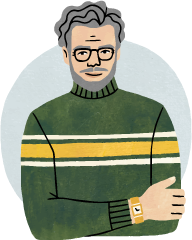Treatment Centers in 93740

At Center for Discovery, we have built a legacy that has helped thousands of patients in eating disorder recovery. Since 1997, our continuum of care takes treatment out of hospitals and into real-life settings. Our evidence-based and trauma-informed treatments give our patients the coping skills and encouragement they need to navigate real-life recovery. Our team gets to the heart of why patients have a disorder—this means asking questions and providing therapies that reveal the root causes, all in a space that is filled with compassion and security. From the moment our patients step through the doors, they’ll begin developing the tools needed for everyday life after treatment.
At Center for Discovery, we have built a legacy that has helped thousands of patients in eating disorder recovery. Since 1997, our continuum of care takes treatment out of hospitals and into real-life settings. Our evidence-based and trauma-informed treatments give our patients the coping skills and encouragement they need to navigate real-life recovery. Our team gets to the heart of why patients have a disorder—this means asking questions and providing therapies that reveal the root causes, all in a space that is filled with compassion and security. From the moment our patients step through the doors, they’ll begin developing the tools needed for everyday life after treatment.
Ascend’s Adolescent Residential Treatment program is an intensive inpatient mental health program for teens who are struggling with severe mental health challenges. This level of care is optimal for youth who may be experiencing significant impairments in day to day life as a result of their depression, suicidality, bipolar disorder, schizophrenia, or other challenges. Our residential treatment program is an integral part of our overall treatment programs with the goal of helping improve the lives of the youth of our community. Ascend Behavioral Health is the only place in the Central Valley where teens have the opportunity to be carefully guided through a smooth transition across our continuum of care that includes a Partial Hospitalization Program (PHP) and Intensive Outpatient Program (IOP) when they are preparing to step down from inpatient residential treatment. We are committed to helping change the trajectory of lives and providing strength and resiliency to the lives of our community’s youth no matter how severe the struggles are.
Ascend’s Adolescent Residential Treatment program is an intensive inpatient mental health program for teens who are struggling with severe mental health challenges. This level of care is optimal for youth who may be experiencing significant impairments in day to day life as a result of their depression, suicidality, bipolar disorder, schizophrenia, or other challenges. Our residential treatment program is an integral part of our overall treatment programs with the goal of helping improve the lives of the youth of our community. Ascend Behavioral Health is the only place in the Central Valley where teens have the opportunity to be carefully guided through a smooth transition across our continuum of care that includes a Partial Hospitalization Program (PHP) and Intensive Outpatient Program (IOP) when they are preparing to step down from inpatient residential treatment. We are committed to helping change the trajectory of lives and providing strength and resiliency to the lives of our community’s youth no matter how severe the struggles are.
See more therapy options for 93740
FAQs - About Treatment Centers and Rehab
How can I find a treatment center in 93740?
The Psychology Today Directory has customizable search options that show potential treatment centers tailored to your location, including inpatient or outpatient, the types of insurance accepted, and even the programs the center specializes in. Finding the right treatment center can be vitally important, and the dropdown filters make it easier to find the best fit for you or your loved one.
How do treatment centers work?
There are treatment centers for individuals dealing with psychiatric issues as well as for those dealing with substance use or addiction, or who are dealing with both, also known as co-occurring disorders. The type of program that is right for an individual depends on their medical and mental health history, the severity of the issues they are dealing with, as well as their treatment goals. Individuals using the directory can filter to find a center best-suited to them based on their gender, the issues they are facing, such as addiction or a mental health condition, or the type of treatments they are seeking.
What is the difference between inpatient and outpatient treatments?
In an inpatient or residential treatment program, individuals receive treatment while living in a facility and have 24/7 access to care by medical professionals. There are various forms of outpatient treatment that offer different levels of care, including Intensive Outpatient Programs (IOPs) and Partial Hospitalization Programs (PHPs). PHPs tend to offer more time-intensive, supervised care than IOPs. Aftercare is another option that offers ongoing treatment for an individual recovering from substance use or addiction after they have achieved initial sobriety, which can take the form of either an inpatient or outpatient program.
How long is rehab?
Short term treatment usually lasts less than 30 days, while long term programs can last 60 days, 90 days, or longer, depending on the needs and goals of the individual and the structure of the program. Individuals searching for a treatment program in the directory can filter results by duration.
How much does rehab cost?
The price of treatment varies according to the length and type of service you search for, such as detox treatment, residential treatment, or outpatient treatment, as well as location and amenities offered. Non-profit centers are typically less expensive than private centers, but may have longer wait lists. Using the filters on the Psychology Today Treatment Center Directory can help narrow down which centers accept insurance plans, and, if so, which ones.
Does insurance cover rehab?
Health insurance typically covers rehab, but the extent of coverage depends on the particular policy, the treatment provider, and the needs of the individual. Individuals are encouraged to check with their insurance providers prior to entering a treatment program. Once you have confirmed coverage, you can use the Insurance filter on the Psychology Today Treatment Center Directory to find and contact centers that accept your insurance.
How do you get someone who refuses treatment into rehab?
It is important to convey compassion and understanding toward an individual dealing with an addiction problem. If a person refuses treatment at first, it’s important for their loved ones to continue to express their concerns in a kind and respectful manner, and to periodically encourage them to get help. It can take time for someone dealing with addiction to gain the motivation to make a change. In the meantime, it can be helpful for loved ones to set boundaries with the individual and educate themselves on the many treatment options that exist in order to have more informed conversations regarding recovery.



